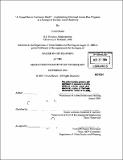"A transit pass in everyone's hand?" : implementing Unlimited Access Pass programs as a strategy to increase transit ridership
Author(s)
Hester, Ursula, 1971-
DownloadFull printable version (9.020Mb)
Alternative title
Implementing Unlimited Access Pass programs as a strategy to increase transit ridership
Other Contributors
Massachusetts Institute of Technology. Dept. of Urban Studies and Planning.
Advisor
Frederick P. Salvucci.
Terms of use
Metadata
Show full item recordAbstract
(cont.) ridership growth induced by UAP programs. The lessons learned are then applied in form of a university pass program at the MBTA in Boston, suggesting program designs, pricing alternatives and estimating impacts on the transit agency, universities and unlimited access pass holders. Unlimited Access Pass (UAP) Programs--arrangements between transit agencies and universities that provide transit passes to group members at a heavily discounted rate through a group purchase program--have become a successful tool to increase ridership and decrease vehicle miles traveled (VMT) and parking demand while yielding an equivalent fare value to transit agencies. Due to the prepaid and discounted nature of the pass these programs level the playing field between the automobile and transit by virtually eliminating the perceived out-of-pocket cost of taking transit. In addition, by capturing the cross-subsidies within a functional entity, such as a university or employer, this technique has the potential to internalize the otherwise external benefits of transit use, such as reduced pressure on limited amount of expensive parking supplies and access roads. It thereby achieves a "win-win" outcome for all of the primary affected groups, while maintaining equitable revenues, increasing ridership and improving off-peak utilization. Despite the apparent success of such programs, particularly with university students, many agencies, especially the largest ones in the United States, have not offered this type of university program, let alone considered a larger scale program targeting different market segments, such as hospitals or other large employers. Drawing on case studies of three agencies that offer successful university and employer UAP programs, this thesis shows that innovative program design allows the agencies to address the most common concerns. It examines why and how UAP programs work and provides a set of implementation guidelines including a recommended pricing model that allows for an equitable and effective way of capturing revenue increases related to
Description
Thesis (M.C.P.)--Massachusetts Institute of Technology, Dept. of Urban Studies and Planning, 2004. Includes bibliographical references (p. 104-105).
Date issued
2004Department
Massachusetts Institute of Technology. Department of Urban Studies and PlanningPublisher
Massachusetts Institute of Technology
Keywords
Urban Studies and Planning.